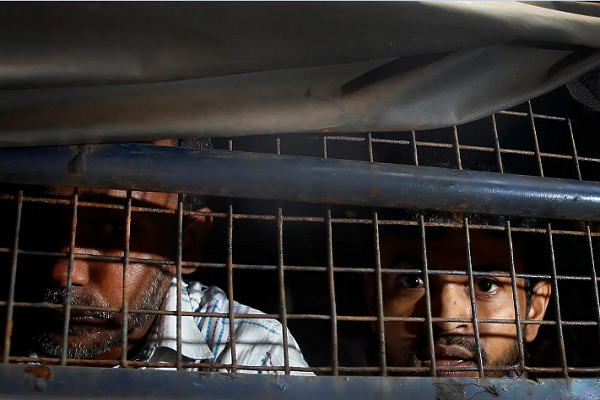12 Muslim Men in India Jail for 18 Years for A Crime They Didn’t Commit

The men, who languished in jail for 18 years, were accused of orchestrating the 7/11 Mumbai train blasts that killed 189 people and injured more than 800 others.
Eighteen years after one of India’s deadliest terror attacks, the Bombay High Court on Monday overturned the convictions of 12 Muslim men who had been jailed for allegedly carrying out the 2006 Mumbai train bombings.
The court ruled that the prosecution failed to prove its case beyond a reasonable doubt, leading to the complete acquittal of all 12 accused.
The decision brings a stunning reversal to a case that once carried death sentences and life terms.
The court’s verdict not only nullified the charges but cast a harsh light on the quality of the investigation into terrorism incidents.
Read More:
The accused men, some of whom faced the death penalty, spent nearly two decades in prison, many without stepping outside even once during that time.
The court dismissed key elements of the prosecution’s case, including eyewitness testimonies and recovered materials, questioning their credibility and admissibility.
Civil liberties advocates, legal experts and political leaders have since called for accountability from law enforcement agencies, particularly the Maharashtra Anti-Terrorism Squad (ATS), over what’s now being called a grave miscarriage of justice.
On July 11, 2006, a series of coordinated bomb explosions on Mumbai’s suburban railway network killed 189 people and injured over 800.
Within months, 13 Muslim men were arrested and charged under the Maharashtra Control of Organized Crime Act (MCOCA).
In 2015, a special MCOCA court found 12 of them guilty. Five were sentenced to death, while seven were handed life imprisonment. One accused, Wahid Shaikh, was acquitted by the trial court after spending nine years behind bars.
Tragically, another, Kamal Ahmad Ansari, died of COVID-19 in prison in 2021. His name is among the 12 men who have been acquitted.
Over the years, the remaining 12 men maintained their innocence and challenged their convictions.
Read More:
In mid-2024, a special bench was finally constituted to hear their appeals, with former Chief Justice S. Muralidhar representing two of the convicts, who highlighted systemic flaws in the investigation.
All India Majlis-e-Ittehadul Muslimeen (AIMIM) leader Asaduddin Owaisi has demanded action against the officers involved, urging the government to confront the institutional failures that led to years of wrongful incarceration.
“Twelve Muslim men were in jail for 18 years for a crime they didn’t commit, their prime life is gone, 180 families lost their loved ones, several were injured, and yet there is no closure for them,” said Owaisi.
“Will the government take action against the officers of the Maharashtra ATS who investigated this case?”
The AIMIM leader said in cases where there is a public outcry, “the approach by police is always to first assume guilt and then go from there”.
“Police officers take press conferences in such cases, and the way the media covers the case, it kind of decides the guilt of a person,” he said.
The appeals filed by the convicted men had been pending before the Bombay High Court since 2015.
The case sheds light on the witch hunt of Muslims under the Hindu-nationalist government of Prime Minister Narendra Modi, whose party regularly faces accusations of riling up anger against the Muslim minority to win votes.
Source: Trt.global



